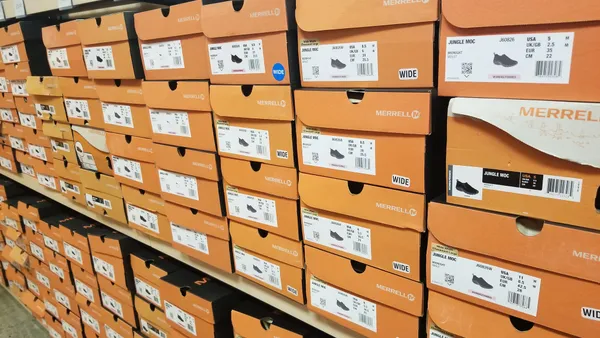Dive Brief:
-
Core retail sales, excluding auto, gas stations and food, fell 0.2% in February from January, according to the U.S. Commerce Department's monthly report Monday, which was delayed due to the government shutdown. Month-over-month core retail sales from December to January were revised to a 0.8% rise, according to the report.
-
A number of categories saw month-over-month declines. Furniture sales in February fell 0.5%, electronics and appliance sales fell 1.3%, apparel sales fell 0.4% and department store sales fell 0.5%. Nonstore retailers, widely seen as e-commerce, saw sales rise 0.9%, the government said.
-
The National Retail Federation said the government shutdown continues "to make comparisons difficult," according to an email to Retail Dive. The organization, which bases its own calculations on the government numbers, said that adjusted retail sales in February fell 0.7% and that seasonally adjusted online and other non-store sales rose up 10.1% year-over-year and 0.9% month-over-month.
Dive Insight:
Cold weather and the timing and scope of tax refunds contributed to February's poor showing, but several economists took the report as a sign that the economy is cooling, possibly just temporarily.
"February retail sales as reported by the U.S. Census Bureau were below expectations and declined 0.2% from the upwardly revised January sales number with building materials, electronics and groceries showing biggest declines as the softness in the housing market and pricing pressure on electronics and food retailers continues," Moody's Investors Service Vice President Mickey Chadha said in comments emailed to Retail Dive.
The report "serves as yet another data point that Q1 expectations should remain in check despite easy comparisons, strong employment/wage growth, and lower gas prices," Wells Fargo analysts led by senior analyst Zachary Fadem wrote in comments emailed to Retail Dive. Wells Fargo Senior Economist Tim Quinlan, in his own comments emailed to Retail Dive, noted, "[I]n the past 15 years we have not seen the 3-month annualized rate go this far into negative territory outside of a recession," adding later, "We do expect a slowing in the pace of personal consumption growth as the business cycle ages."
But Quinlan's team sees much of the challenges that showed up in February's numbers as temporary, due mostly to especially cold weather and a hit to consumer confidence from the shutdown, and noted that the government also revised its January numbers significantly upward. "[T]he softness indicated by last week's personal income and spending report and corroborated today by this mostly negative retail sales report overstates the weakness, and we expect both confidence and sales to rebound in a more meaningful way as the year progresses," according to their note.
The report comes amid mixed indications of consumer confidence last month. The Conference Board consumer confidence index declined in March to 124.1, after increasing in February to 131.4. Consumers' assessment of business and labor market conditions also declined, from 172.8 to 160.6, and consumers' short-term outlook for income, business and labor market conditions decreased from 103.8 in February to 99.8 this month, according to that report. But according to the Survey of Consumers from the University of Michigan, consumer confidence "rebounded in March to 98.4 from last month's 93.8, slightly above the average of 97.2 recorded in the past 26 months."
The Commerce Department is catching up with its retail sales reports: Results for March will be released April 18, the government said.












